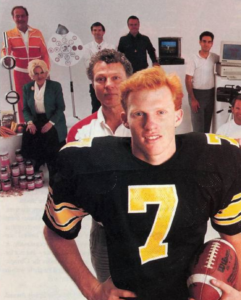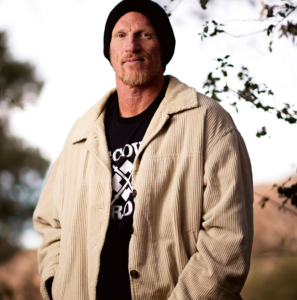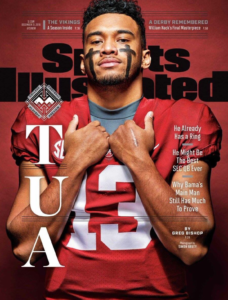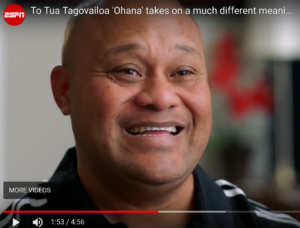Fathers cut a wide swath, don’t they?
You could be an example of strength and courage, an inspiration to generations of offspring. You could be the guy who was always there, without fail, cheering, win or lose, at every game, regardless of the sport. You could be the Cool Dad, the one with all the jokes. Hell, you could abandon your children and still cut a swath when even by your absence you drop a permanent sour turd in their lives that never goes away.
Or you could do it like Marv Marinovich.
 1988: Marv and his army and their perfect product. (SI.com)
1988: Marv and his army and their perfect product. (SI.com)
Marv’s son Todd is almost fifty years old. Wasn’t it just a couple seasons ago when the RoboQB, bred and conditioned by Marv, crashed into our consciousness and stunned our notions of what supportive and beneficial parenting means to a budding elite athlete?
Wasn’t that just, like, a few years back?
No, actually it was 1988, 31 years ago, when Sports Illustrated dumped America’s first test-tube QB in our laps. It was sick. We read about Marv working the kid’s hamstrings, and putting him on a balance beam, as an infant. About Marv feeding him pure food and pure music from day one, forbidding fast food and candy and Coke and crappy tunes and cartoons, finding a dozen experts to develop every aspect of his game. Workouts were seven days a week. Even Marv said, “I suppose it was a little overdone.”
But the kid said he wasn’t forced into it. “I choose to do it,” he insisted.
And it was all a lie. He was forced. He didn’t want it. And on the down-low, he was doing everything from Big Macs and Ding Dongs to buckets of beer and clouds of pot.
This writer was there in Husky Stadium in 1990 on the day it all began to unravel. It was the day we realized the machine was human. Guys with names like Jones and Emtman and Farr and Hoffman and Clifford were unleashed on him, in a stadium as loud as it’s ever been before or since that day. And the test-tube QB cracked and shattered to the floor. “All I saw was purple,” he famously said.
A year later he was a Raiders first-rounder.
And the drinking, the drugs, the pressure, the fear, the parties, they all came crashing down on him, and in a couple seasons he’d run his course in the NFL and he was finished.
Yeah Marv, it was a little overdone. You did it all for you, it was all for Marv, wasn’t it, and when it backfired you blamed Todd. You were a marginal NFLer yourself, and in your twisted narcissism you thought you could make up for your own frustrations by test-tubing and beating and prodding and shaming your way to your own son’s greatness, and take credit and live the charmed life in the afterglow. You were wrong.
Todd has surfaced in ubiquitous “Where Are They Now” pieces for the last twenty-five years. And the story is always the same. He was down and out. He hit the bottom. He thinks he’s got it together now. He’s found art. He’s found a new relationship that’ll save him. He’s been to therapy. He’s gotten clean.
Then we hear another news piece from TMZ or Buzzfeed about another stumble, something stupid, a parole violation, arrested for possession, theft, trespassing. Two years ago he was arrested when he was found naked in a stranger’s back yard.
So Sports Illustrated, the guys who dumped him on us 31 years ago, bring him back to us in a feature article as he approaches fifty.
 2019: Still working on it. (SI.com)
2019: Still working on it. (SI.com)
He’s learning to be human, they say. Maybe so, but it’s a heartbreaking story, and the learning thing isn’t pretty. Stories like this are supposed to wrap it all up with a bow and end with birds chirping and daisies in bloom. But it’s ugly and it smells and it leaves you hanging and hoping and praying for Todd because this man, quite clearly, still does not have his shit together.
Marv is everywhere in the piece. Beating up strangers when Todd was a child. Beating his wife. Demanding purity and fealty from his son, with violent consequences, punching Todd in the car on the way home from games. And ignoring his daughter, barely acknowledging her in favor of the boy he molded with his own bare hands to be a legend.
That daughter now cares for Marv in his dementia. It’s virtually impossible to feel compassion for him.
Meanwhile Todd still cycles between drugs, jail, rehab, parole violations, painting, relationships, parenting, going somewhere but going nowhere. They play Welcome Back Kotter for him when he spins that revolving door at the local cell block.
Marv’s web of destruction goes on. Todd, his sister, their mother, their kids, their relationships, everyone Marv ever challenged or assaulted, they’re all damaged, and they’re haunted by reminders every day, whether it’s missing teeth or just horrible memories that won’t fade away.
That’s the thing about abuse. The damage never ends. It just spreads. A wide swath, a la Marv Marinovich.
And as Todd and Marv swirl around us once again, another shining star and his father come our way.
 Is history about to repeat itself? (SI.com)
Is history about to repeat itself? (SI.com)
Tua Tagovailoa just quarterbacked the Alabama Crimson Tide all the way to the national championship game. His father Galu speaks with reverence of Samoan culture, and defends his family’s ways, as sports fans recoil at his tales of raising Tua with The Bible and The Belt. Faith and discipline. To question this is to question Samoan culture, and that ain’t right, I guess…
Is Galu another Marv Marinovich? He had little Tua running laps on the beach when the boy was two. Tua got the belt when he threw interceptions. Tua did exactly what his father said, or “I was gonna get it.” Including his college choice. Galu said Bama. The kid went to Bama. And the family moved from Hawaii to Tuscaloosa to keep an eye on him in college.
For God’s sake, Tua even sees his father in Coach Saban. Just like Todd saw Marv standing on the sidelines, in every coach he ever had.
For Tua’s sake, maybe the parallel won’t play out. Maybe it’s all good. But it reeks.
Is beating a child OK because that’s the Samoan Way? Part of living a respectful life? Maybe we’re supposed to think it’s all OK because, hey look. It worked.
 Galu: “It’s simple, really.” Ummm, maybe not. (SI.com/espn/youtube)
Galu: “It’s simple, really.” Ummm, maybe not. (SI.com/espn/youtube)
Really? What if the kid wasn’t a football player, wasn’t Samoan, just did something his dad didn’t like? Is the belt OK now? Guess what. I bet not. Why do cultural roots and athletic success suddenly make the belt OK?
To be clear. Hitting a kid, abusing a kid in any way, is not OK. Regardless of culture, it means you’re a weak parent who can’t come up with a better way of teaching values of respect and family. And you’re a parent who doesn’t grasp – or maybe you don’t care about – the real lesson you’re teaching, the one you’ll pass on to the next generation as you cut that wide swath: Bigger and stronger means you can do whatever the hell you want to a tiny little person. Sound about right? God help us if we’re still sending that message to tomorrow’s leaders.
And for the record, I’ve questioned myself, doubted myself, as a father many times over the last 35 years. But I can’t imagine looking at our three caring, mature, responsible adult offspring, all of whom are parents themselves now, and thinking…
“Damn, I wish I’d been like Galu and used the belt on those kids.”
Really guys, Ohana doesn’t have to be creepy.
ESPN’s Desmond Howard thought the “Ohana” feature on Tua, where Galu gleefully confirmed The Bible and The Belt, was hilarious. Back in the studio, Howard cracked up and declared Galu as “The Samoan Joe Jackson,” referring to Michael and siblings’ wack job father.
Not so much, Desmond. Seems a lot more like Galu’s taking cues from Marv. Galu’s a big man, and he’s happy to tell you about that big wide swath he’s cutting for his son.
But maybe there’s still time to rescue Tua. For his sake, let’s hope so.
One Reply to “Not a pretty story”